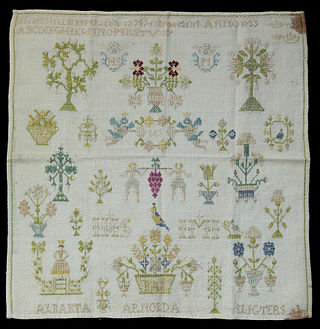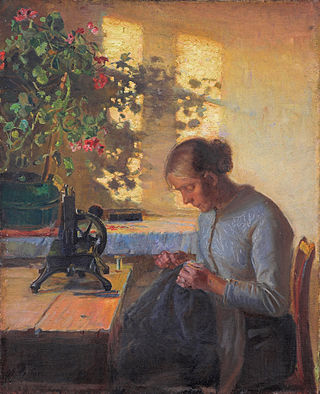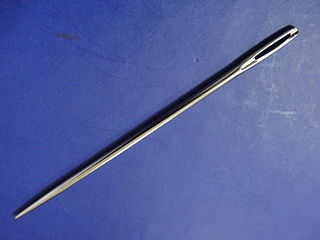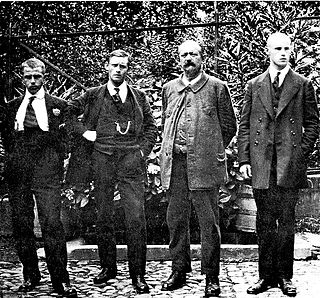
Cross-stitch is a form of sewing and a popular form of counted-thread embroidery in which X-shaped stitches in a tiled, raster-like pattern are used to form a picture. The stitcher counts the threads on a piece of evenweave fabric in each direction so that the stitches are of uniform size and appearance. This form of cross-stitch is also called counted cross-stitch in order to distinguish it from other forms of cross-stitch. Sometimes cross-stitch is done on designs printed on the fabric ; the stitcher simply stitches over the printed pattern. Cross-stitch is often executed on easily countable fabric called aida cloth whose weave creates a plainly visible grid of squares with holes for the needle at each corner.

Embroidery is the craft of decorating fabric or other materials using a needle to apply thread or yarn. Embroidery may also incorporate other materials such as pearls, beads, quills, and sequins. In modern days, embroidery is usually seen on caps, hats, coats, overlays, blankets, dress shirts, denim, dresses, stockings, scarfs, and golf shirts. Embroidery is available in a wide variety of thread or yarn colour.

Singer Corporation is an American manufacturer of consumer sewing machines, first established as I. M. Singer & Co. in 1851 by Isaac M. Singer with New York lawyer Edward C. Clark. Best known for its sewing machines, it was renamed Singer Manufacturing Company in 1865, then the Singer Company in 1963. It is based in La Vergne, Tennessee, near Nashville. Its first large factory for mass production was built in 1863 in Elizabeth, New Jersey.

A sewing machine is a machine used to sew fabric and materials together with thread. Sewing machines were invented during the first Industrial Revolution to decrease the amount of manual sewing work performed in clothing companies. Since the invention of the first sewing machine, generally considered to have been the work of Englishman Thomas Saint in 1790, the sewing machine has greatly improved the efficiency and productivity of the clothing industry.

Sewing is the craft of fastening or attaching objects using stitches made with a sewing needle and thread. Sewing is one of the oldest of the textile arts, arising in the Paleolithic era. Before the invention of spinning yarn or weaving fabric, archaeologists believe Stone Age people across Europe and Asia sewed fur and leather clothing using bone, antler or ivory sewing-needles and "thread" made of various animal body parts including sinew, catgut, and veins.

Isaac Merritt Singer was an American inventor, actor, and businessman. He made important improvements in the design of the sewing machine and was the founder of what became one of the first American multi-national businesses, the Singer Sewing Machine Company.

The Technical University of Berlin is a public research university located in Berlin, Germany. It was the first German university to adopt the name "Technische Universität".

Machine embroidery is an embroidery process whereby a sewing machine or embroidery machine is used to create patterns on textiles. It is used commercially in product branding, corporate advertising, and uniform adornment. It is also used in the fashion industry to decorate garments and apparel. Machine embroidery is used by hobbyists and crafters to decorate gifts, clothing, and home decor. Examples include designs on quilts, pillows, and wall hangings.

A sewing needle, used for hand-sewing, is a long slender tool with a pointed tip at one end and a hole to hold the sewing thread. The earliest needles were made of bone or wood; modern needles are manufactured from high carbon steel wire and are nickel- or 18K gold-plated for corrosion resistance. High quality embroidery needles are plated with two-thirds platinum and one-third titanium alloy. Traditionally, needles have been kept in needle books or needlecases which have become objects of adornment. Sewing needles may also be kept in an étui, a small box that held needles and other items such as scissors, pencils and tweezers.

Brother Industries, Ltd. is a Japanese multinational electronics and electrical equipment company headquartered in Nagoya, Japan. Its products include printers, multifunction printers, desktop computers, consumer and industrial sewing machines, large machine tools, label printers, typewriters, fax machines, and other computer-related electronics. Brother distributes its products both under its own name and under OEM agreements with other companies.
Bernina International AG is a privately owned international manufacturer of sewing and embroidery systems. The company was founded in Steckborn, Switzerland, by a Swiss inventor Fritz Gegauf. The company develops, manufactures, and sells goods and services for the textile market, primarily household sewing-related products in the fields of embroidery, quilting, home textiles, garment sewing, and crafting. The origins of the company lie in the invention of the hemstitch sewing machine, invented in 1893 by a Swiss inventor and entrepreneur Karl Friedrich Gegauf. Currently, the company's products include sewing machines, embroidery machines, serger/overlocker machines, and computer software for embroidery design.
PFAFF is a German manufacturer of sewing machines and is now owned by the SGSB Co. Ltd.

Fritz Gegauf (1893-1980) was a Swiss inventor and founder of the Bernina International, an international manufacturer of sewing and embroidery systems. He was the son of Karl Friedrich Gegauf (1860-1926), inventor of the hemstitch sewing machine.
Janome is a Japanese company that produces sewing machines, with manufacturing plants in Japan, Taiwan and Thailand.
William Hillman was a British bicycle and automobile manufacturer. In partnership with Louis Coatalen he founded the Hillman-Coatalen Company in 1907, later the Hillman Motor Company after Coatalen's defection to Sunbeam in 1909.
JUKI Corporation is a Japanese manufacturer of industrial sewing machines and domestic sewing machines, as well as high-technology SMT assembly equipment and is headquartered in Tama-shi, Tokyo. It is one of the leading industrial machine manufacturers. JUKI ranks as the no.1 sewing machine manufacturer in the world. Headquartered in Japan, the company currently has manufacturing facilities in Japan, China, and Vietnam, and markets its products on six continents, in about 170 countries. Up until 1988, the company was known as Tokyo Juki Industrial Company, Ltd. The company motto, which doubles as a customer creed, is "Mind & Technology".

The schiffli embroidery machine is a multi-needle, industrial embroidery machine. It was invented by Isaak Gröbli in 1863. It was used to create various types of machine embroidery and certain types of lace. It was especially used in the textile industry of eastern Switzerland and Saxony Germany, but also in the United Kingdom and the United States. Schiffli machines evolved from, and eventually replaced manually operated "hand embroidery" machines. The hand embroidery machine used double ended needles and passed the needles completely through the fabric. Each needle had a single, continuous thread. Whereas the schiffli machine used a lock stitch, the same technique used by the sewing machine. By the early twentieth century schiffli machines had standardized to ten and fifteen meters in width and used more than 600 needles.

Singer Bangladesh Ltd. is a Bangladeshi sewing machine manufacturer company starting in the British Colonial era when Bangladesh was a part of the Indian subcontinent. Through a gradual growth now it is one of the manufacturers and distributors of consumer electronics alongside sewing machines.

Karl Friedrich Gegauf was a Swiss entrepreneur and inventor. He was the founder of Bernina International, a Swiss sewing machine factory.














